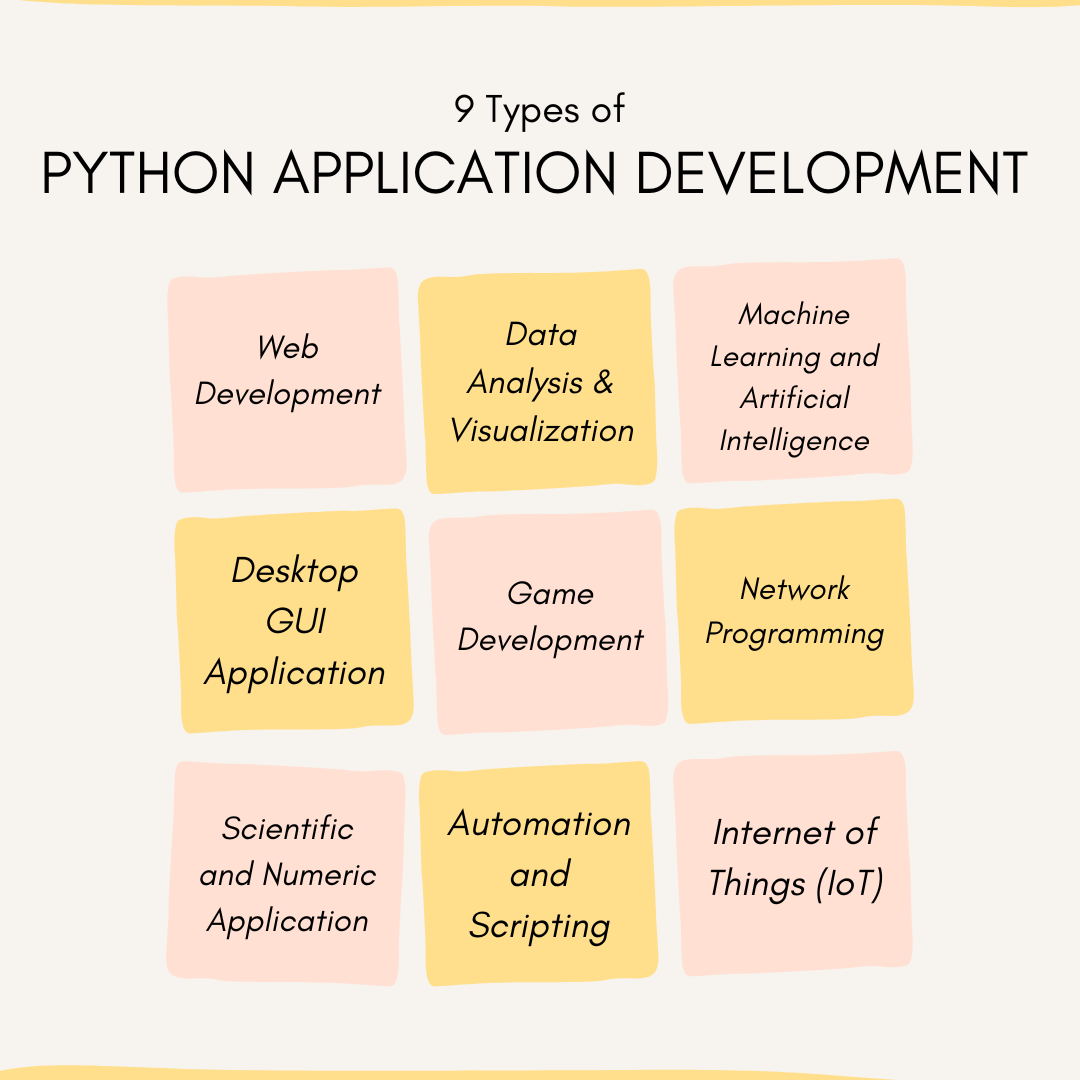In the ever-evolving world of technology, Python has emerged as a beacon of versatility, simplicity, and efficiency. Loved by beginners for its readability and by professionals for its vast libraries and frameworks, Python application development has cemented its place as a cornerstone in the development of a myriad of application types.
Whether you’re diving into programming for the first time or looking to expand your development repertoire, understanding the types of applications that can be built with Python is akin to unlocking a treasure trove of possibilities.
Let’s embark on a journey through the diverse landscape of applications that Python enables creators to bring to life.
1. Web Development
Python’s foray into web development is powered by robust frameworks such as Django and Flask. These frameworks not only simplify the development process but also ensure applications are secure and scalable.
From social media platforms to content management systems and e-commerce websites, Python’s versatility makes it an ideal choice for backend development, enabling developers to focus on writing logic rather than getting bogged down by the intricacies of protocol implementations.
2. Data Analysis and Visualization
The rise of big data has catapulted Python to the forefront of data analysis and visualization. Libraries like Pandas, NumPy, and Matplotlib transform Python into a powerful tool for data manipulation, statistical modeling, and graphical representation.
This makes it perfect for generating insights from large datasets, financial analysis, and even for the creation of dashboards for business intelligence.
3. Machine Learning and Artificial Intelligence
Python’s simplicity and the vast array of libraries such as TensorFlow, Keras, and PyTorch have made it the go-to language for AI and machine learning projects.
Whether it’s developing sophisticated algorithms for predictive modeling, natural language processing, or computer vision, Python serves as the backbone for building systems that mimic human intelligence, enabling innovations in fields like healthcare, finance, and autonomous vehicles.
4. Desktop GUI Applications
Despite the rise of web applications, desktop applications still hold their ground in scenarios requiring offline access, intensive processing, or specialized hardware interaction.
Python, with libraries such as Tkinter, PyQt, and Kivy, allows for the creation of user-friendly desktop applications for Windows, Mac, and Linux.
These applications range from simple utilities to complex graphical interfaces for software tools used in scientific research, media production, and engineering simulations.
5. Game Development
While not as commonly associated with game development as C# or C++, Python has its niche in the gaming world. Libraries like Pygame provide a platform for developing games and multimedia applications.
It’s particularly favored for prototyping, educational games, and 2D game development, offering a gentle learning curve for beginners and a rapid development cycle for more experienced programmers.
6. Network Programming
Python’s standard library includes several modules that make network programming simpler.
Developers can create applications that manage network traffic, automate protocol implementation, or even develop new protocols.
This is particularly useful in the development of tools for network testing, monitoring, and security.
7. Scientific and Numeric Applications
The scientific community has embraced Python for its simplicity and the powerful scientific libraries like SciPy, NumPy, and SymPy.
These tools are indispensable for simulations, mathematical computations, and statistical analyses in fields ranging from astrophysics to zoology, making Python a staple in the researcher’s toolkit.
8. Automation and Scripting
One of Python’s most celebrated uses is for writing scripts to automate mundane tasks.
From batch renaming files to scraping data from the web or automating test cases in software development, Python scripts save time and reduce error, enhancing productivity across various domains.
9. Internet of Things (IoT)
With the advent of microcontrollers that can run Python, such as the Raspberry Pi and MicroPython boards, Python has become a key player in IoT applications.
These range from home automation systems to industrial sensors and beyond, highlighting Python’s versatility in connecting the physical and digital worlds.
Conclusion
Python’s broad applicability, supported by a vibrant community and a rich ecosystem of libraries and frameworks, makes it an invaluable tool for developers across disciplines.
Whether you’re looking to build complex web applications, or simply automate repetitive tasks, Python offers a gateway into the world of programming that is both deep and accessible.
As we continue to push the boundaries of what technology can achieve, Python’s role in driving innovation and simplifying complexity remains undisputed. Embrace Python, and let your creative and technical aspirations take flight!
Andolasoft is one of the leading providers of Python application development services. We craft stunning applications for businesses of all sizes and varying industries.


